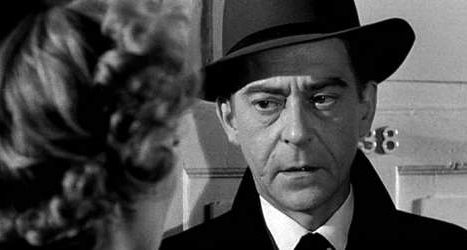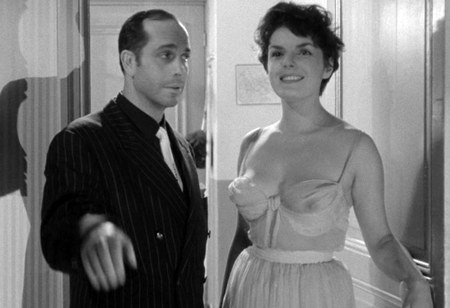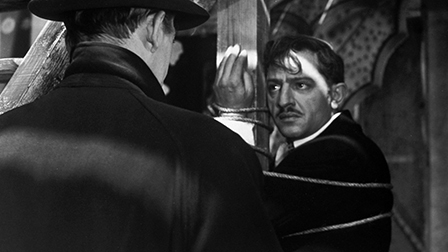Reviewed by Glenn Erickson
The French film Rififi (Du rififi chez les hommes) made such a splash in New York art houses in 1956, it was earned wide distribution through normal channels. It became known as "the crime thriller with the suspenseful jewelry heist". Most American audiences were unaware that French writers and filmmakers had fallen in love with hardboiled Yankee pulp fiction, as well as the pessimistic crime films dubbed by their critics with the phrase film noir. Excellent French crime pictures had come before but Rififi was one of the few that succeeded on the international market. Its primary writer is the French "Serie Noire" crime writer August Le Breton. Many Americans assumed that credited director Jules Dassin was a Frenchman as well.
Actually, Dassin was one of the most prominent of the Hollywood directors blacklisted by the HUAC witch hunts. A stage director who got started as a directing trainee at MGM, Dassin made the exemplary short subject The Tell-Tale Heart before reaching his stride with four terrific noir thrillers, The Naked City, Thieves' Highway, Brute Force and Night and the City. Darryl Zanuck so liked Dassin's work that he set up Night and the City to be filmed in London, just to keep Dassin away from the lynch mob mentality of organizations like The American Legion. But it didn't work -- Dassin spent four years in exile in Rome and Paris. Projects fell through when French and Italian producers were threatened with economic reprisals if they allowed Dassin to work. Dassin says that when a French producer signed him for Rififi, it was because he was willing to work for very little money.

As it happened, Rififi became a home run for Dassin, an enormous success that inspired a series of imitators using the word 'Rififi' in their titles. Le Breton's tale is a mini-epic about a gang of professional crooks that come together to execute a difficult robbery. Special technological skills, split-second timing and nerves of steel are required. The model for this "heist caper" crime subgenre was John Huston's The Asphalt Jungle, but the cultured Dassin added his own experience to Le Breton's tough-guy storyline. The crooks range from a slick safecracker who wants to impress women, to a crook with a wife and daughter. The leader Tony le Stéphanois (Jean Servais) is a noble loser fresh from prison, whose only chance is to make a big score. After giving a particularly brutal beating to his unfaithful girlfriend Mado (Marie Sabouret), Tony shakes his depression by initiating the big heist. The well-planned caper culminates in a lengthy, realistic, dialogue-free break-in scene that involves cutting through buildings and outwitting a modern alarm system. All goes perfectly until imported safecracker Cesar (Jules Dassin, the director) steals a diamond tidbit for the sexy singer (Magali Noel) he's dating. Opportunistic crooks waste no time -- the thieves suddenly find themselves being forced to surrender their hard-earned loot.
Rififi is a completely engrossing film. The Paris streets of 1955 are a wonder to behold. Economic limitations force Dassin to film his car scenes in real moving vehicles, adding to the feeling of 'being there', of being in a time machine. Back in Hollywood, the unyielding Production Code had frustrated some of Dassin's stabs at gritty reality. In this French picture he's able to depict all manner of vices and sordid activity. The adult attitude starts with the depiction of the hero. Le Stéphanois risks all to save a little boy, but he's also a psychological wreck prone to acts of brutality against women.

The sex angle is more pronounced as well. The wife of gang member Mario (Robert Manuel) sees nothing wrong with greeting her husband's friends in a daringly revealing nightgown. It's the kind of content that filled American pulp paperbacks but never made it into 1955's Kiss Me Deadly or The Big Combo. Those U.S. pictures had to answer to the censors for errata as tame as a black singer holding a microphone stand "too suggestively."
We find out that Tony's once-vaunted reputation has crumbled when gamblers in a card game treat him like a bum. The weary Jean Servais communicates this loss of respect; at the time of filming, the actor's career was in a slump as well. Even more telling is the sight of Cesar when he realizes that he must pay for breaking the code of the underworld. Tied to a post and awaiting a bullet, actor Dassin shows a despairing look of defeat that director Dassin must have known all too well.
The word 'Rififi' is introduced in a cabaret song by the gorgeous, Turkish-born Magali Noel, later known for standout roles in Federico Fellini films. Rififi apparently translates as 'the rough and tumble' of the underworld life, but it's also suggested that it might also refer to violent sex. The impeccably chosen cast includes the expressive Robert Hossein, whose haunted looks make him a worthy adversary to the formidable Jean Servais.
The famed half-hour heist scene is done without dialogue or even a music soundtrack. Viewers must pay attention to follow the complicated way the crooks penetrate the jewelry store and crack its safe without setting off any alarms. Although it's been topped many times -- by Dassin himself in his 1964 caper comedy Topkapi -- the sequence has a hypnotic effect. The thieves work so well and so hard, that we can't help but contemplate the relationship between work, risk and reward. Are they blind fools, or brilliant masterminds thwarted only by a chance of fate?

Of the most talented directors banished from Hollywood, Joseph Losey and Cy Endfield took up permanent residence in England, while Edward Dmytryk recanted, named names and was permitted to resume his career. John Berry spent most of the 1950s in Paris before the 1960 blacklist thaw allowed his return to Hollywood. But Jules Dassin fell in love with Greek actress Melina Mercouri and made six movies with her, including the Oscar winner Never on Sunday). Unlike the tragic characters in his noir classics, Dassin never surrendered and never compromised. His American noirs are some of the best, and his Rififi remains the most revered French crime thriller.
Criterion's Dual Format Blu-ray + DVD of Rififi improves on their 2001 DVD with a more stable, sharp and detailed transfer that faithfully reproduces the essence of cameraman Philippe Agostini's gray-on-gray cinematography. The film is in French with subtitles, and Criterion has also included the English-dubbed soundtrack that most Americans saw in 1956.
Although everything in the movie looks like a real location, famed production designer Alexandre Trauner's set sketches are included to demonstrate that key interior settings were indeed filmed in a studio. The best extra is an excellent interview with director Dassin, taped in 2000. As feisty and opinionated as ever, Dassin discusses the essence of the blacklist and chronicles the way that Clare Booth Luce, then the Ambassador to Italy, conducted a vendetta to destroy his directing career in Europe. Dassin also tells amusing stories about some of the absurdities of working in the studio system, where a good performance on the MGM or Fox baseball team might insure better terms in a directing contract.
The insert pamphlet essay is by critic J. Hoberman. All extras are duplicated on the Blu-ray disc.
On a scale of Excellent, Good, Fair, and Poor,
Rififi Blu-ray + DVD rates:
Movie: Excellent
Video: Excellent
Sound: Excellent
Supplements: Stills, set diagrams, interview with director Jules Dassin.
Deaf and Hearing-impaired Friendly?
YES; Subtitles: English
Packaging: Keep case
Reviewed: February 2, 2014
Republished by permission of Turner Classic Movies.

DVD Savant Text © Copyright 2014 Glenn Erickson
See more exclusive reviews on the Savant Main Page.
The version of this review on the Savant main site has additional images, footnotes and credits information, and may be updated and annotated with reader input and graphics.
Return to Top of Page
|

